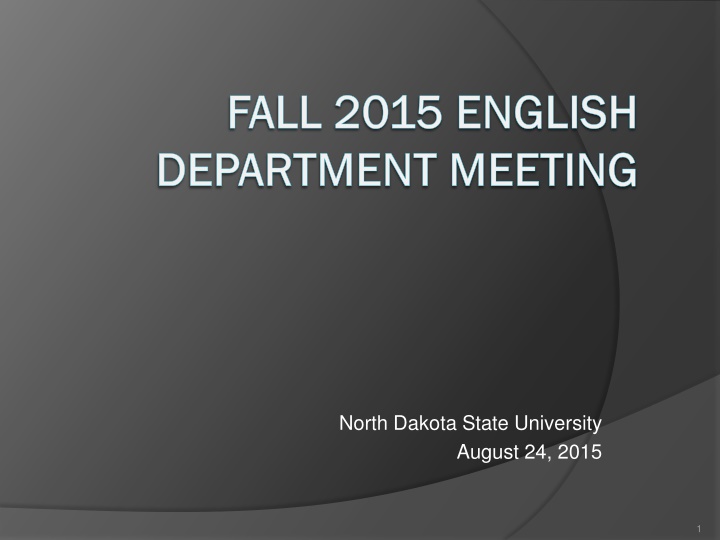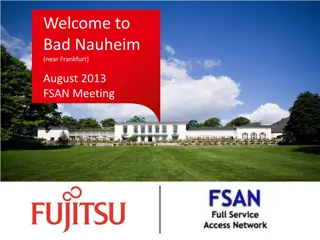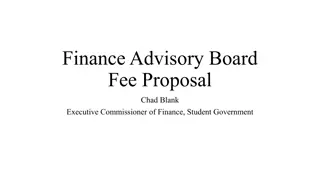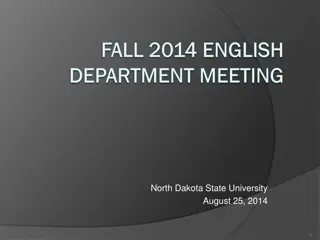
University English Department Meeting - Fall 2015 Highlights and Updates
Discover the latest happenings at North Dakota State University's English Department Fall 2015 meeting, including promotions, new faculty introductions, part-time instructors, graduate student instructors, office procedures, and achievements from the 2014-15 academic year. Stay informed about research activities, teaching initiatives, and more.
Download Presentation

Please find below an Image/Link to download the presentation.
The content on the website is provided AS IS for your information and personal use only. It may not be sold, licensed, or shared on other websites without obtaining consent from the author. If you encounter any issues during the download, it is possible that the publisher has removed the file from their server.
You are allowed to download the files provided on this website for personal or commercial use, subject to the condition that they are used lawfully. All files are the property of their respective owners.
The content on the website is provided AS IS for your information and personal use only. It may not be sold, licensed, or shared on other websites without obtaining consent from the author.
E N D
Presentation Transcript
FALL 2015 ENGLISH FALL 2015 ENGLISH DEPARTMENT MEETING DEPARTMENT MEETING North Dakota State University August 24, 2015 1
NDSU English Department NDSU English Department Promotion: Full Professor: Miriam Mara Andrew Mara 2
NDSU English Department NDSU English Department New Assistant Professor: Lisa Arnold, Rhetoric/Composition & WPA New Lecturers: Aimee Hilgers (ESL Composition) Cheryl Dunlop (UDW) Jamee Larson (FYW) 3
NDSU English Department NDSU English Department New Part-time Instructors: Kellam Barta Megan Even Crystal Gilson Heather Slomski Kai Thorstad 4
NDSU English Department NDSU English Department New Graduate Student Instructors: Ibtissem Belmihoub (PhD) Carole Butcher (PhD, History) Luc Chinwongs (PhD) Alison Driscoll (MA) Nesreen Eldoliefy (PhD) Jordan Olson (MA) Ashleigh Petts (PhD) Fawzia Riji (MA) Patricia (Tish) Schnase (MA) Maggie Silvernail (MA) Anushi Weerasinghe (MA) 5
NDSU English Department NDSU English Department Office Procedures: http://www.ndsu.edu/english/office_procedures/ Part-time Admin. Assistant: Sunny Clark: sunshine.clark@ndsu.edu 6
NDSU English Department NDSU English Department 2014-15 Highlights: Research/Scholarly/Creative Activities: Peer Reviewed Publications (published or accepted): National or International Invited Presentations: Juried Presentations: New Grants: 29 1 26 13 @ $145,782 Teaching: Strong assessment practices, revealing good levels of student learning and leading to curriculum revision (ongoing this year). Teaching initiatives (Transatlantic and Pacific Project, Shakespeare/Honors Guthrie Theater Trip, Service & Project-Based Learning, Community Literacy, Women & Gender Studies, Career Talks) 7
NDSU English Department NDSU English Department 2014-15 Highlights: Service and Leadership: Betsy Birmingham, Associate Dean Amy Rupiper Taggart, Director of General Education National and International boards and committees Awards: Emily Wicktor, Gayle Johnson: Department Vogel Teaching Award Tatjana Schell: NDSU Dissertation Fellowship Jessica Piek: Department Graduate Teaching Award Justin Atwell, Kaylee Jangula Mootz: Department Graduate Student Paper Awards 8
NDSU English Department NDSU English Department Department Mission Statement: The mission of the English Department at North Dakota State University is to cultivate understanding, knowledge, and appreciation of the English language, its speakers and writers, and its literatures and cultures, such that students and department members use the language creatively, critically, and effectively to participate ethically in civic and professional life. https://www.ndsu.edu/english/mission_statement/ 9
NDSU English Department NDSU English Department Department Goals/Priorities for the Past Year: Internal Goals Promote the humanities: Engage in one activity this academic year on campus (in or out of the classroom) or in the community that promotes the humanities, specifically the study and appreciation of language and literature and their significance and effective use in creative expression and day-to-day life. 10
NDSU English Department NDSU English Department Department Goals/Priorities for the Past Year: Internal Goals Strengthen our scholarship and teaching: Complete or start one additional scholarly or professional development project this academic year. Attend one pedagogical luncheon or other event supporting teacher development. 11
NDSU English Department NDSU English Department Department Goals/Priorities for the Past Year: Internal Goals Work across sub-disciplinary lines when possible: Share research projects at a roundtable discussion of research, held once each semester. 12
NDSU English Department NDSU English Department Department Goals/Priorities for the Past Year: Internal Goals Maintain a collegial environment: Strengthen existing or create new lines of communication with one department member this academic year. Or work specifically on one of the points listed in Powerpoint on department collegiality from August 2014 department meeting (link on department website). 13
NDSU English Department NDSU English Department Department Goals/Priorities for the Past Year: External Goals Recruit regular and tuition-paying graduate students: Develop professional writing certificate or low-residency MFA program. Create a graduate student recruitment plan. Participate in the General Education reform process. 14
NDSU English Department NDSU English Department Department Goals/Priorities for the Past Year: External Goals Promote the Department: Via department newsletter, FB page, Talking Points, and outreach to alumni, advisory board, and potential donors. Invite AHSS Development Officer, Monique Anderson, to a department meeting. 15
Large and Diverse Department in a Large and Diverse Department in a Land Grant Research University Land Grant Research University Teaching as a common priority Varying areas of emphasis and responsibility (and, thus, varying expectations, pressures, and stressors) Varying evaluation criteria 16
Managing Stress, Anxiety, & Conflict Managing Stress, Anxiety, & Conflict 2. The NDSU Ombud Office offers various services to manage conflict and build stronger interpersonal relationships with colleagues: http://www.ndsu.edu/ombud/services/ 3. Full-time benefitted employees have access to the Employee Assistance Program, which offers counselling services for workplace issues such as the following: Job-related conflict Coping with change Job stress coping skills Dealing with difficult co-workers Here s the link: http://www.ndsu.edu/hr/benefits/eap/ 17
Managing Stress, Anxiety, & Conflict Managing Stress, Anxiety, & Conflict Campus resources are available for managing stress, anxiety, and conflict, work-related or otherwise. Although I want to be helpful as chair in dealing with and strategizing about how to best mitigate these issues, we have access to professionals who are better trained and equipped to address these needs. 1. The Campus Counselling Center hosts workshops on meditation and mindfulness throughout the semester and offers many other services intended to support good mental health: http://www.ndsu.edu/counseling/meditation_and_mi ndfulness/ 18
Managing Stress, Anxiety, & Conflict Managing Stress, Anxiety, & Conflict 4. FORWARD Work-Life Satisfaction Resources: https://www.ndsu.edu/fileadmin/forward/documents/ FORW_6570_ResourcesBro.pdf 5. Steps for managing conflict from College Chair s retreat (forthcoming) 19
Maintaining a Collegial Environment Maintaining a Collegial Environment Code of Conduct, NDSU Policy 151 Employees are expected to uphold the values of honesty, respect, integrity and trust. In addition, when interacting with one another and the public, all are expected to behave in a professional, collegial, cordial, civil, positive, respectful and ethical manner. https://www.ndsu.edu/fileadmin/policy/151.pdf 20
Maintaining a Collegial Environment Maintaining a Collegial Environment 1. Encouragement Encouragement helps us do our best work. Let s take time to recognize and express appreciation to our colleagues for their good work. 2. Support Let s make an effort to be the type of colleague who listens to and helps a peer when it would be easier to focus on our own responsibilities and projects. 21
Maintaining a Collegial Environment Maintaining a Collegial Environment 3. Collaboration As we collaborate on committees and in other settings, let s cultivate a sense of understanding and goodwill, be willing to respectfully challenge one another when necessary, and support the results of our collective decision-making. 4. Rapport Let s find ways to build rapport with one another based on our interests both inside and outside of academe. 22
Maintaining a Collegial Environment Maintaining a Collegial Environment 5. Risk and Opportunity Let s be willing to venture outside our own projects and areas of interest to explore common goals and forge new connections with our department, college, and university colleagues. 6. Guidance Let s be the kind of colleague who challenges others to grow as professionals and who helps others find the positive in situations when they have lost hope or are filled with self-doubt. Let s also be wise and humble enough to reach out and ask others for help when we need it. 23
Maintaining a Collegial Environment Maintaining a Collegial Environment 7. Live Your Definition No matter our position within the department structure, let s consider our definition of a good colleague and then strive for it. 24






















